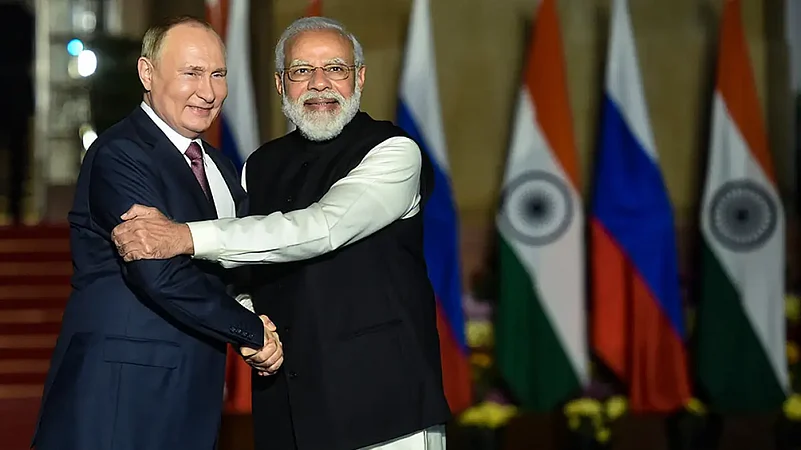Having got all its western allies to line up against Russia, the Joe Biden administration seems singularly focused on getting India on board. Washington has been cut up with New Delhi for not condemning Russian
aggression on Ukraine. A stream of US officials had hot-footed to India to convince New Delhi with a combination of coaxing, sweet talk and threats. Foreign minister Subrahmanyam Jaishankar and defence minister Rajnath Singh travelling to Washington for the 2+2 dialogue with their American counterparts, Russia-India ties will be a major part of the conversation. Much of the talk will be on weaning India away from its long-time friend.
Advertisement
The ministerial dialogue between India and the US will take place in Washington on April 11. Jaishankar and Rajnath Singh will meet US secretary of state Antony Blinken and defence secretary Llyod Austin. "The ministerial dialogue would enable both sides to undertake a comprehensive review of cross-cutting issues in the India-US bilateral agenda related to foreign policy, defence and security with the objective of providing
strategic guidance and vision for further consolidating the relationship,’’ the MEA said in a statement on Thursday. Important global developments and regional issues will be on the agenda.
There will be a major push from the US to get India to decrease its dependence on Russian arms and energy. India’s imports of Russian oil are minuscule, considering much of its energy comes from the Gulf kingdoms. New Delhi has so far withstood western pressure, but it remains to be seen if it can continue doing so. India will likely stick to its guns and explain that the government's priority was to the people of India. New Delhi was
always on the lookout for energy imports at cheaper prices at a time when international prices are skyrocketing.
Advertisement
However, much is being made of India wanting to buy cheap oil from Russia.
There is constant talk of New Delhi getting concession rates from Moscow and Washington is keen to disrupt this deal. In fact, Jaishankar during an event with UK foreign secretary Liz Truss had pointed to the fact that it
is not India but Europe which buys more energy from Russia. “If you look at the major buyers of oil and gas from Russia, I think you’ll find most of them are in Europe. We ourselves get the bulk of our energy supplies from the Middle East, about 7.5-8 pc of our oil from the US in the past, may be less than a per cent from Russia.” He added for good measure that in the month of March, after Russia’s invasion of Ukraine, Europe bought 15 per cent more gas and oil from Russia than the month before.
At Thursday’s weekly briefing, MEA spokesman Arindam Bagchi was persistently questioned on pressure from the US and its allies on trade ties with Russia. He said New Delhi’s effort was to "stabilise economic ties
with Russia’’ at a time when that country was under all-embracing sanctions. The rupee-rouble trade mechanism will likely come into play.
Bagchi said that discussions were underway to see what kind of payment mechanism would work for both countries. He pointed out that "India has been open about its engagements with Russia,’’ and pointed like Jaishankar to Europe buying much more oil and gas from that country.
Advertisement
In Washington, Jaishankar will have to navigate his way cautiously as the Biden administration is likely to put maximum pressure. The Biden administration as well as the general western opinion has always been
anti-Putin. The kind of language used by US officials against the Russian president is quite shocking. Thug and criminal are part of the everyday lexicon. This kind of language is not ever used by Chinese President Xi
Jinping, though China poses a much greater threat to the US than Russia. It perhaps has to do with the Cold war mindset. This is why Washington is focused on weaning New Delhi away from Moscow.
Advertisement
Whatever may be the reason, India does not respond kindly to threats. This is why it was brash of Daleep Singh, US deputy national security adviser to threaten India "of consequences" if New Delhi tried to circumvent sanctions now in place against Russia. He also "cautioned India against enhancing ties with Moscow,’’ as it ran the risk of being caught in a web of secondary sanctions. This did not go down well with the Indian public. Yesterday, the White House press secretary in answer to a reporter's question said “We do not think India should accelerate or increase imports of Russian energy and other commodities even as, obviously, those decisions are made by individual countries.’’ Jen Psaki added, “And (the US is) also making clear that we stand ready to support India as in any efforts to diversify its imports and serve as a reliable supplier even as they're only importing about one to two per cent of their oil from Russia."
Advertisement
The US will play good cop bad cop in trying to pressurise India. The stakes are high for India and it will not wish to offend the US. However national interest will count first.




















